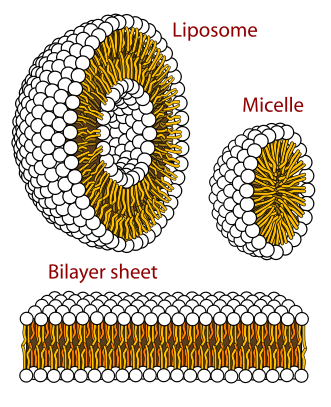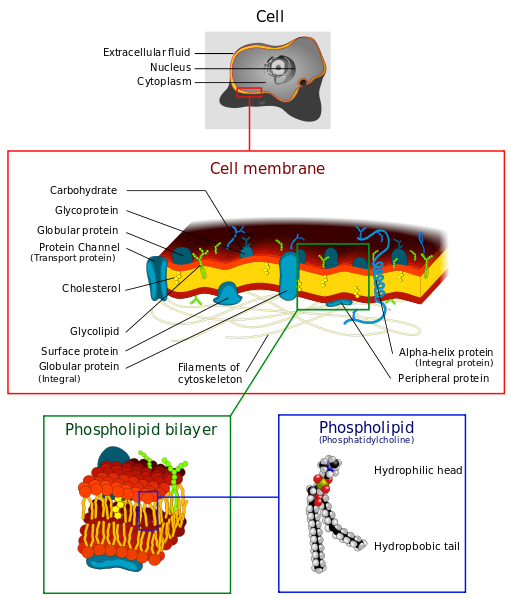 | ||||
Organic Chemistry: What Is a Lipid Molecule?
You have free access to a large collection of materials used in a college-level introductory Cell Biology Course. The Virtual Cell Biology Classroom provides a wide range of free educational resources including Power Point Lectures, Study Guides, Review Questions and Practice Test Questions.
SPO VIRTUAL CLASSROOMS
How polar phospholipids spontaneously arrange in liquid.
 | ||||||
Need Help with Chemistry?
SPO offers free PowerPoint lectures, sample test
questions, review questions and assignments on many different science topics.
Below are links to those that relate to chemistry:
Phospholipids
Phospholipids have a hydrophobic, “water hating,” hydrocarbon tails and hydrophilic, "water loving" phosphate groups on the end, so they are soluble in both water and oil.
Our cell membranes are made mostly of phospholipids arranged in a double layer with the tails from both layers facing inward and the heads facing outward, called the lipid bilayer.
Waxes
These lipids are esters of alcohol, insoluble in water and difficult to hydrolyze, or break down.
The SPO website is best viewed in Microsoft Explorer,
Google Chrome or Apple Safari.
Page last updated: 8/2015
PAGE 2 < Back to Page 1
Steroids
Cholesterol is a type of steroid, with a central core consisting of four fused rings, a characteristic shared by all steroids. Our bodies make about 2g of cholesterol per day, about 85% of blood cholesterol, while only about 15% comes from dietary sources.
Wax forms protective and waterproof layers on some plants, bacteria, animal fur and integuments of insects.
Chemical structure of wax cetyl palmitate.
Sources and Helpful Organic Chemistry Resources
- Bauman, R. (2014) Microbiology with Diseases by Taxonomy, 4th ed., Pearson Benjamin Cummings.
- Park Talaro, K. (2008) Foundations in Microbiology, McGraw-Hill.
- Biomolecules - The Lipids animated interactive tutorial from Wisc-Online.com.
- Organic Chemistry Lecture Main Page from the Virtual Cell Biology Classroom.
- The Digestion and Absorption of Fats animated tutorial and quiz from WH Freeman.
- Macromolecules: Proteins, Nucleic Acids, Carbohydrates & Lipids from WH Freeman.
- Cell Membranes animated tutorial from John Kyrk.
Cholesterol is precursor to sex hormones, such as testosterone and progesterone, and Vitamin D. Our cell membranes contain a lot of cholesterol which helps to keep the membrane flexible and fluid even when our cells are exposed to cooler temperatures.
Testosterone
 | ||||||
SPO is a FREE science education website. Donations are key in helping us provide this resource with fewer ads.
Please help!
(This donation link uses PayPal on a secure connection.)





